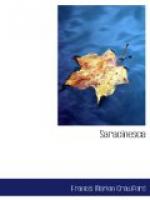The Cardinal’s words had struck deep, in a deep nature. Giovanni had given Del Ferice a very fair exposition of the views he believed himself to hold, on the day when they had walked together after Donna Tullia’s picnic. He believed himself a practical man, loyal to the temporal power by principle rather than by any sort of enthusiastic devotion; not desirous of any great change, because any change that might reasonably be expected would be bad for his own vested interests; not prejudiced for any policy save that of peace—preferring, indeed, with Cicero, the most unjust peace to the most just war; tenacious of old customs, and not particularly inquisitive concerning ideas of progress,—on the whole, Giovanni thought himself what his father had been in his youth, and more or less what he hoped his sons, if he ever had any, would be after him.
But there was more in him than all this, and at the first distant sound of battle he felt the spirit stir within him, for his real nature was brave and loyal, unselfish and devoted, instinctively sympathizing with the weak and hating the lukewarm. He had told Del Ferice that he believed he would fight as a matter of principle: as he leaned against the marble pillar of the door in the Palazzo Frangipani, he wished the fight had already begun.
Waiting there, and staring into the moving crowd, he was aware of a young man with pale and delicate features and black hair, who stood quietly by his side, and seemed like himself an idle though not uninterested spectator of the scene. Giovanni glanced once at the young fellow, and thought he recognised him, and glancing again, he met his earnest look, and saw that it was Anastase Gouache, the painter. Giovanni knew him slightly, for Gouache was regarded as a rising celebrity, and, thanks to Donna Tullia, was invited to most of the great receptions and balls of that season, though he was not yet anywhere on a footing of intimacy. Gouache was proud, and would perhaps have stood aloof altogether rather than be treated as one of the herd who are asked “with everybody,” as the phrase goes; but he was of an observing turn of mind, and it amused him immensely to stand unnoticed, following the movements of society’s planets, comets, and satellites, and studying the many types of the cosmopolitan Roman world.
“Good evening, Monsieur Gouache,” said Giovanni.
“Good evening, prince,” replied the artist, with a somewhat formal bow—after which both men relapsed into silence, and continued to watch the crowd.
“And what do you think of our Roman world?” asked Giovanni, presently.
“I cannot compare it to any other world,” answered Gouache, simply. “I never went into society till I came to Rome. I think it is at once brilliant and sedate—it has a magnificent air of historical antiquity, and it is a little paradoxical.”
“Where is the paradox?” inquired Giovanni.
“’Es-tu libre? Les lois sont-elles
respectees?
Crains-tu de voir ton champ pille par le voisin?
Le maitre a-t-il son toit, et l’ouvrier son
pain?’”




